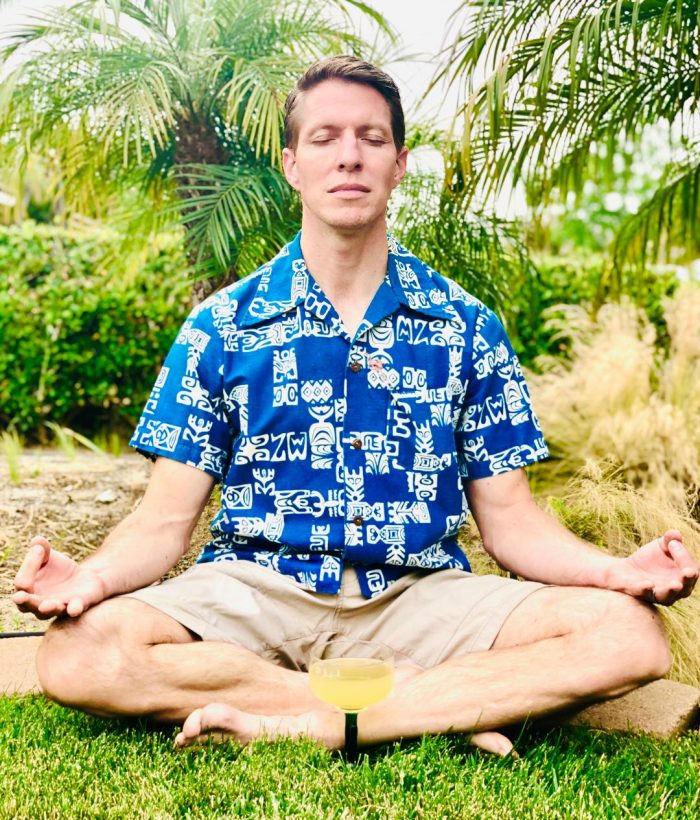What the King of Escapism can teach us about Mindfulness:
Every day, the zombie population is multiplying.
It’s the little things…
Like driving somewhere and not remembering a moment of the trip. Checking the internet for a minute and hours later realizing we’ve fallen down a rabbit hole of more directed content than we intended. Not stopping to ask ourselves who we are and what we believe in.
Our bodies are socially distancing from our minds when they should be quarantining with them.
So what’s the problem? Who cares if I just go on autopilot for life?
Well, when you get to the end of the play, you’ll realize that the main character of the performance, never showed up. You!
How do we not miss our stage call, then? Sages, psychologists, scientists, and, it turns out, a certain singer all say: be mindful. Cultivate that state of gentle consciousness and awareness in each moment so you can live intentionally.
In his 2006 song, “Breathe In, Breathe Out, Move On,” Jimmy Buffett sings about buying a watch that doesn’t tell time and is never wrong. It simply says “Now” on it. His timepiece allows him to not miss the present moment by letting his mind slip along the time continuum as most of us do.
We often unconsciously set our watches a few minutes slow and live in the regret of the past or a few minutes fast and live in the anxiety of the future. In his song, “I Love the Now, he sings:
“Past is dead and gone; don’t try to shake it. Tomorrow’s right around the corner; I’ll get there somehow; I’m stuck in the meantime, and I love the now.”
What else can we do to practice mindfulness? Slow. Down.
As Zen Master Thich Nhat Hahn notes, “If the car goes fast, I go fast,” and when I go fast, I often go on autopilot.
My youngest brother Albin has never chosen to own a car. While working at Legal Aid Justice Center in Richmond, Virginia, he would often purposefully walk for the hour it took from his home to the city. What he lost in speed, he made up in awareness and enjoyment.
While walking, he often not only smelled the flowers and felt the warmth of the sun, but he also found a multitude of discarded objects on the side of the road—things no one would have noticed if they were taking a faster method of travel. He actually found enough interesting photographs (remember when we used to print out our pictures?) that he included them in a special recurring section of his self-published magazine, Young Philosopher.
Slowing down is just what Buffett espouses in his song, “Slow Lane” from his album, Life on the Flipside. He encourages us to slow down and realize that “half the fun is getting there.”
The pandemic has forced us to operate at less than breakneck speed—let’s not lose this lesson as we start imagining post-pandemic life.
And then there are the health benefits. With COVID-19 mutations out there and a way to go before herd immunity, we can’t ignore any tool that might protect us. The research shows that mindfulness can reduce stress, manage anxiety, and fend off depression, among other things. This, in turn, can lower blood pressure and boost one’s immune system—not the worst thing anytime, but especially important in the midst of a pandemic.
Mindfulness is not dependent on a particular belief system and it’s accessible to everyone all the time. It requires a non-judgmental lens and a bit of practice…
Well, okay, it’s actually a life-long practice. But the more skillful you get at it, the more of its benefits you’ll reap. Most importantly, you’ll be able to live life more fully. You’ll be able to live your life—not the life your parents hoped for you, or the life your teachers expected of you, or the life society demanded of you.
As a hospice chaplain, I have the privilege of talking to a lot of people at the end of their lives, just before the curtain call.
And the worst way to end the play is with regrets, especially the regret that you missed your life.
Most of us think of Jimmy Buffett’s music as pure escapism. His recent Broadway play after all was titled, “Escape to Margaritaville.” And isn’t escaping the opposite of mindfulness you might ask? Not necessarily.
The key to mindfulness is compassionate awareness.
It’s observing outside and inside and then making a conscious choice. Sometimes we might choose to stay where we are, and sometimes we might choose to head to St. Somewhere. But it’s in the choosing that the freedom comes. It’s first in the ability to choose and then the actual choosing that frees us from living our lives in autopilot.
Finally, mindfulness might help us nurture connection with others and extend compassion. In this increasingly divided world that might be just what we need.
Buffett encourages us to find some stillness and give a little more slack to each other in his song, “Slack Tide” on Life on the Flipside:
“Well, we could use some quiet. We could use a little calm. Find the good in everybody. Share that ‘one love’ balm.”
Mindfulness isn’t a panacea. But it could save our lives in more ways than one.
Slow down. Breathe in, breathe out, move on. Stay safe. Bring compassionate attention to your thoughts and the world around you—including all the influences in that world that scream for your attention. Be here now and now and now. Your immune system and your true self will thank you.
Go explore the many evidence-based resources on mindfulness out there to help you start.
While we haven’t been able to do many things that we wanted to do during this pandemic, we still have to make do with wherever we are.
Maybe we couldn’t attend a Jimmy Buffett concert, although maybe we can still drink a “perfect margarita in a Mason jar.” But we have to do it mindfully.
Because, like life, it always tastes better that way!
 Share on bsky
Share on bsky


Read 16 comments and reply